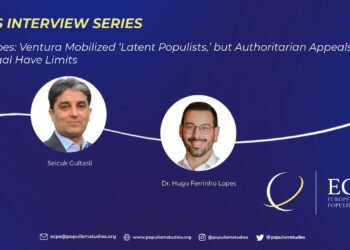In a compelling interview with ECPS, Dr. Salim Cevik argues that Turkey has “crossed the biggest threshold from competitive authoritarianism to full authoritarianism.” Highlighting the arrest of Ekrem Imamoglu, Dr. Cevik sees it as a targeted move to eliminate democratic competition: “He is being arrested because he could potentially defeat Erdogan.” Populism, once central to Erdogan’s rule, is giving way to raw coercion: “Force is the fundamental strategy of Erdogan.” Dr. Cevik also condemns Western silence, especially from Europe and the US, warning that their inaction amounts to complicity. “Erdogan feels very strong… because he has international backing.” Drawing a parallel with past mistakes on Putin, he cautions: “You can’t really trust a personal autocracy for strategic partnership.”
Interview by Selcuk Gultasli
In a wide-ranging and sobering interview with the European Center for Populism Studies (ECPS), Dr. Salim Cevik—Political Scientist and Researcher at the German Institute for International and Security Affairs—offers a critical diagnosis of Turkey’s deepening authoritarian turn under President Recep Tayyip Erdogan. Framing the recent arrest of Istanbul Mayor Ekrem Imamoglu as a pivotal moment in Turkey’s political trajectory, Dr. Cevik asserts that “we’ve crossed the biggest threshold from competitive authoritarianism to full authoritarianism.” While acknowledging that political repression is not new in Turkey, he emphasizes that this particular case marks a critical rupture because it directly targets “the most potent rival of Erdogan” and aims to eliminate any realistic possibility for the opposition to win an election.
Dr. Cevik situates this development within Erdogan’s long-standing strategy of personalizing power and dismantling institutional checks and balances. Over the course of two decades, Erdogan has “sidelined all important political figures,” absorbed the party into his persona, and gradually brought the judiciary, media, business sector, and civil society under his direct control. This personalization of rule has been “formalized” through the switch to a presidential system, which Dr. Cevik sees as a culmination of earlier informal power consolidations.
While Erdogan’s rule was long bolstered by a populist strategy that fused economic provision with religious-nationalist rhetoric, Dr. Cevik argues that this strategy is faltering. Erdogan is now “no longer the popular figure” he once was, as economic decline has eroded his legitimacy among even his core supporters. This, Dr. Cevik suggests, is what pushes the regime to rely increasingly on coercion rather than consent: “Populist mobilization is no longer the key term to understand Turkish authoritarianism… Force is the fundamental strategy of Erdogan.”
Of particular concern is the muted response from Western powers, which Dr. Cevik interprets as tacit approval. He criticizes both the United States and the European Union for enabling Erdogan’s autocratization, noting that “Erdogan feels both very weak because he’s losing popular legitimacy, but he’s also feeling very strong… because he has international backing.” In Europe, especially, strategic interests tied to Turkey’s military capacity and geopolitical location have led to a dangerous silence. “Europe made the same mistake with Putin,” Dr. Cevik warns. “I see no reason why Erdogan should be trusted more than Putin… It’s not only normatively and morally wrong—it’s also strategically blind thinking.”
In this critical conversation, Dr. Cevik calls attention not only to Turkey’s alarming democratic backsliding but also to the global implications of Western complacency in the face of authoritarian consolidation.
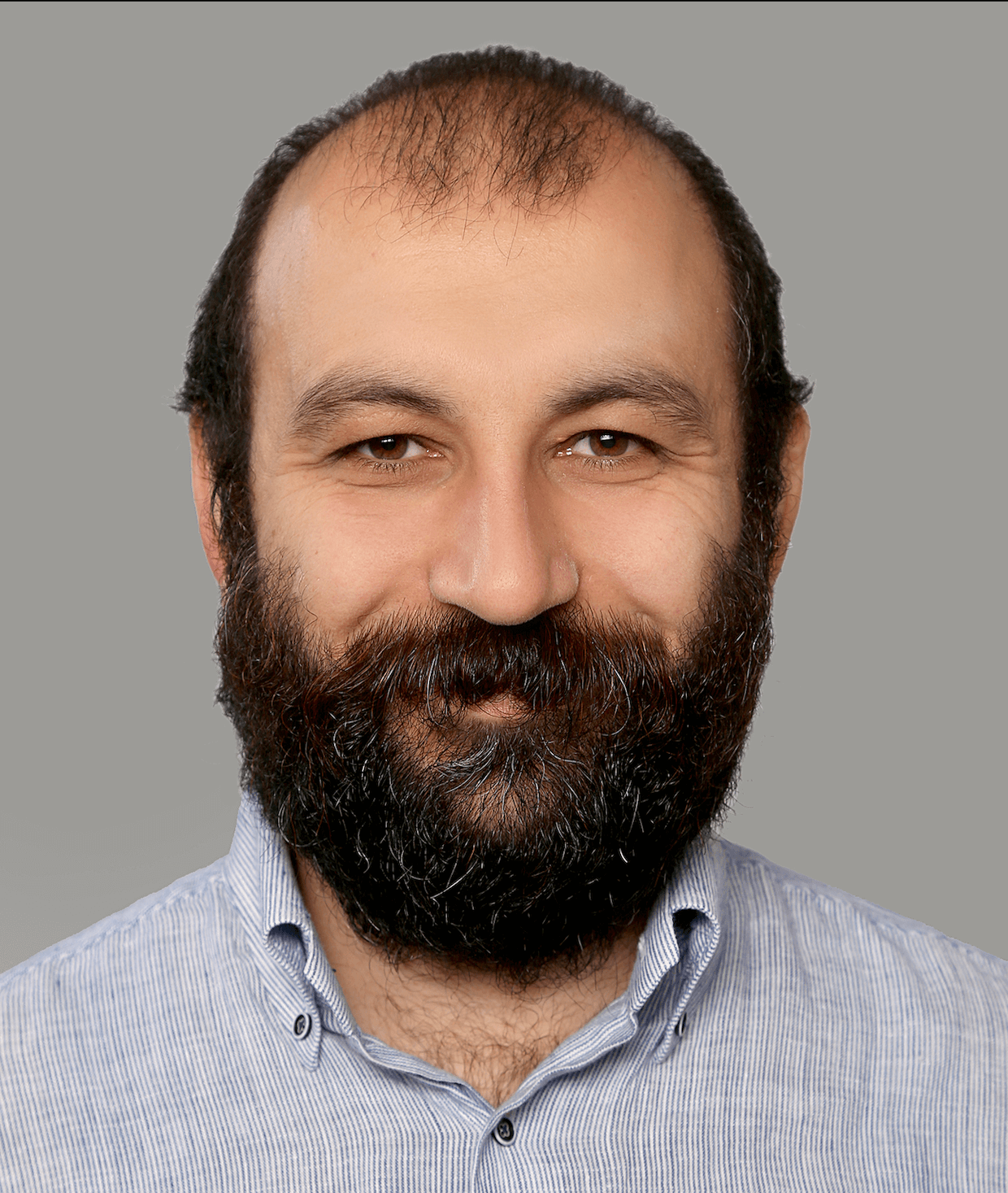
Here is the transcription of the interview with Dr. Salim Cevik with some edits.
Erdogan Regime Is No Longer Competitive—It’s Full Authoritarianism
Dr. Cevik, thank you very much for joining our interview series. Let me start right away with the first question: To what extent does the arrest of Ekrem Imamoglu represent a definitive rupture in Turkey’s transition from competitive authoritarianism to full-fledged autocracy?
Dr. Salim Cevik: Thank you for inviting me, and for the question. I think this marks a major threshold. But to be honest, he is not the first politician to be arrested in Turkey. The country has been on an authoritarian trajectory for more than a decade, which has involved the imprisonment of many politicians—particularly members of the Kurdish political movement, who have been arrested en masse. Some are still behind bars, the most prominent among them being Selahattin Demirtas, who has been in prison for more than eight years. So, in that sense, Imamoglu’s arrest is nothing new in Turkey—but it is new in the sense that it aims to destroy the competitive element of the political regime.
When we talk about competitive authoritarianism, it is an authoritarian system, anyway—but what distinguishes it from full authoritarian regimes is that, in competitive authoritarianism, there is a realistic possibility that the opposition can win an election. Now, why is Imamoglu being arrested and not someone else? I think there is a clear answer to that: he is the most potent rival of Erdogan. He is being arrested because he could potentially defeat Erdogan in the next elections. If you put people who could win elections behind bars, that, by definition, undermines the competitive dimension of competitive authoritarianism. Because if you arrest whoever is going to win, then it’s no longer competitive—it becomes a fully authoritarian system. So, in that sense, I think we’ve crossed the biggest threshold from competitive authoritarianism to full authoritarianism.
Force Is Now Erdogan’s Strategy
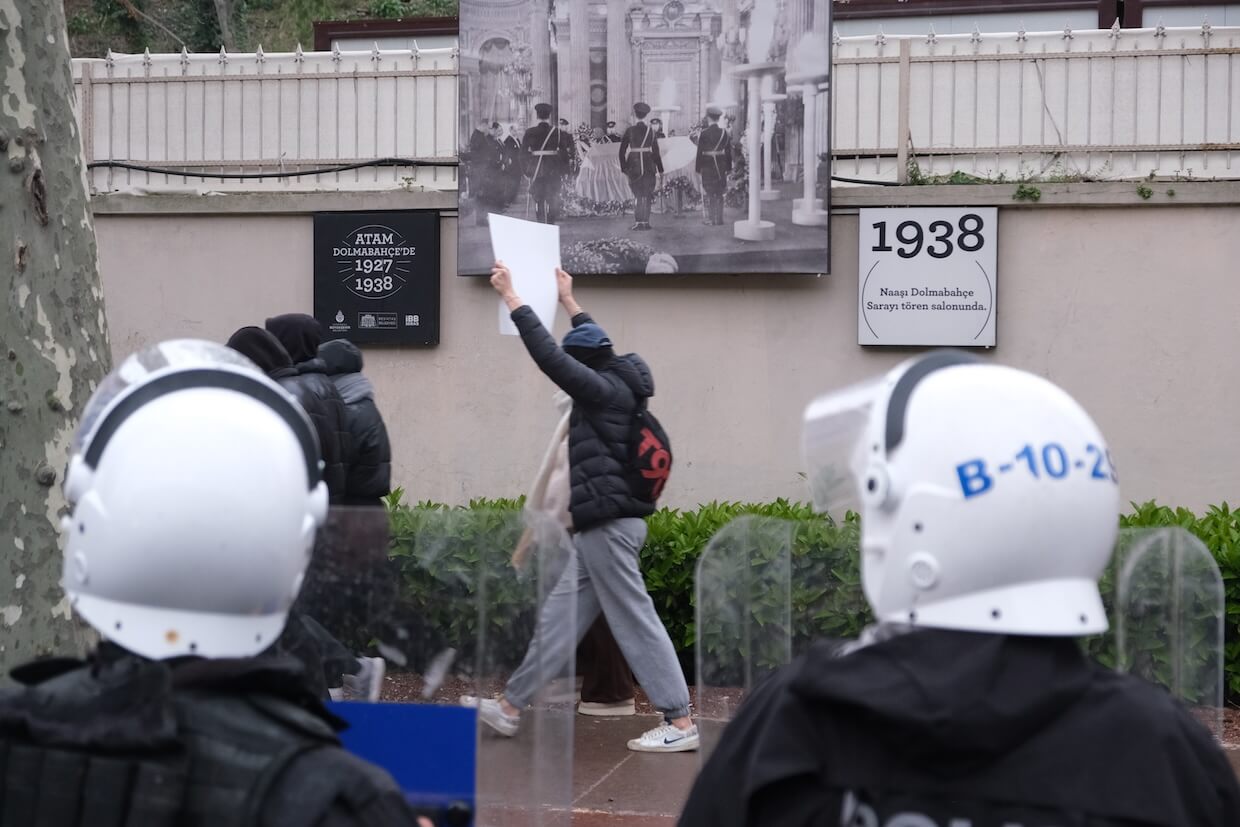
How has Erdogan’s brand of populism evolved into an instrument of authoritarian consolidation, and how central is the creation of internal “enemies” to this strategy?
Dr. Salim Cevik: Populism and the creation of internal enemies have been central to Erdogan’s authoritarianism. That has been the case over the years—even when he was not yet a fully autocratic leader and when Turkey’s democracy was functioning relatively well. Erdogan has consistently employed a populist strategy for political mobilization, and he has now been in power for more than two decades. The first decade was relatively—or at least acceptably—democratic, and initially even pro-democratic. However, starting with his second term, during his second decade in power, he began to grow increasingly authoritarian.
Over these more than 20 years, he has always created internal enemies, and those enemies have actually changed over time. They have included Kemalists, Gulenists, Kurds, and Turkish nationalists—at different stages of his political career, he has targeted different groups. He managed to establish a minimum winning coalition to defeat each internal enemy. That’s his political style and strategy. In that sense, populism has been integral to the establishment of authoritarianism in Turkey.
However, when we talk about this recent event—this arrest—and Turkey crossing a threshold from competitive to full authoritarianism, I don’t think populism is the right term here. Populism, by definition, is about being popular. Populist autocrats usually mobilize the majority around themselves, and they create internal enemies in order to build this minimum winning coalition—at least to configure a majority. That tactic—creating internal enemies—has been Erdogan’s strategy for more than 20 years.
But as I said in the previous question, we are now crossing a threshold from competitive to full authoritarianism. Erdogan has been a popular politician—he has always been a very popular politician. He consistently managed to create a winning majority, a coalition of a minimum winning majority. He is now crossing that threshold because he believes, and sees, that he can no longer do that. He is no longer the popular figure. He no longer has 51 percent behind him, and that’s why he is crossing this threshold. So, I think populist mobilization is no longer the key term to understand Turkish authoritarianism.
Of course, the process I’m talking about has just started, and we don’t know where it will lead. But if everything goes according to Erdogan’s expectations—and if Turkey becomes a full authoritarian regime rather than a competitive one—then he no longer needs to be popular. It will not be a majority authoritarian regime; it will be an authoritarian regime ruled by a minority. And that means he will be ruling by force, rather than by creating the consent of the majority through populist means. But, this is just the beginning of the process. Where we are heading is that populism is no longer Erdogan’s fundamental strategy. Now on, force is the fundamental strategy of Erdogan.
Populism Dismantled the Rule of Law—Now Erdogan Rules Alone
Would you characterize the current crisis as the culmination of a long-standing populist logic that inherently undermines liberal democratic norms?
Dr. Salim Cevik: Yes. This populist strategy that Erdogan has pursued so far has enabled him to reach this point. It has allowed him to dismantle the rule of law and undermine political liberties. It has enabled him to inflict suffering on individuals and groups he has designated as internal enemies. But, as I mentioned in the previous question, those internal enemies are no longer the minority. Now, he is creating an internal enemy that will likely, by the end of this process, be the majority—making it a forceful authoritarianism. Ultimately, it was populism—and the systematic dismantling of the rule of law and the liberal protections that accompany it—that brought us to this point and enabled Erdogan to cross the threshold we are now discussing.
In what ways has the personalization of power under Erdoğan blurred institutional lines between the state, party, and judiciary?
Dr. Salim Cevik: Well, in very fundamental ways. I mean, when Erdogan came to power, the AKP was a ‘cadre’ movement. It had a number two—Abdullah Gul—a number three, Bulent Arinc. Some would even call Abdullatif Sener number four, and the list would go on. We had a powerful cabinet with very prominent politicians, etc. So, it was a genuine cadre movement. Now, there is no number two within the AKP—let alone a number three or a cadre—and the ministers no longer carry any real weight. Even in this current crisis, we see that Erdogan is, in a way, defending himself. He no longer has credible political allies to speak on his behalf. So, everything is now personalized in Turkey.
But it has first started with the personalization of power within the party. Erdogan initially hijacked the party. It had been a party of prominent figures—a cadre movement with a political ideology, or at least a claim to conservative democracy. But step by step, he personalized power within the party. He sidelined all the important political figures and stripped the party of its political substance. When we talk about the party’s ideology or political beliefs today, there’s really nothing left—because over the past 20 years, Erdogan has continuously shifted his coalitions, leaving no consistent ideological foundation. So, the party became Erdogan.
After that, he personalized other centers of power. He brought the judiciary under his control. He turned the party’s control over the state into personal control—and since the party is Erdogan, this meant bringing the judiciary, the media, the business community, and civil society under his direct influence. So, at the end of the day—with the switch to the presidential system, which in many ways formalized these already existing informal power configurations—the regime became fully personalized. That transformation, already largely complete by 2013–14, was cemented through institutional change. Now, we are talking about a single individual ruling not only over the executive, but also the judiciary, the parliament, civil society, and all segments of power.
Strong Enough to Suppress, Too Weak to Compete
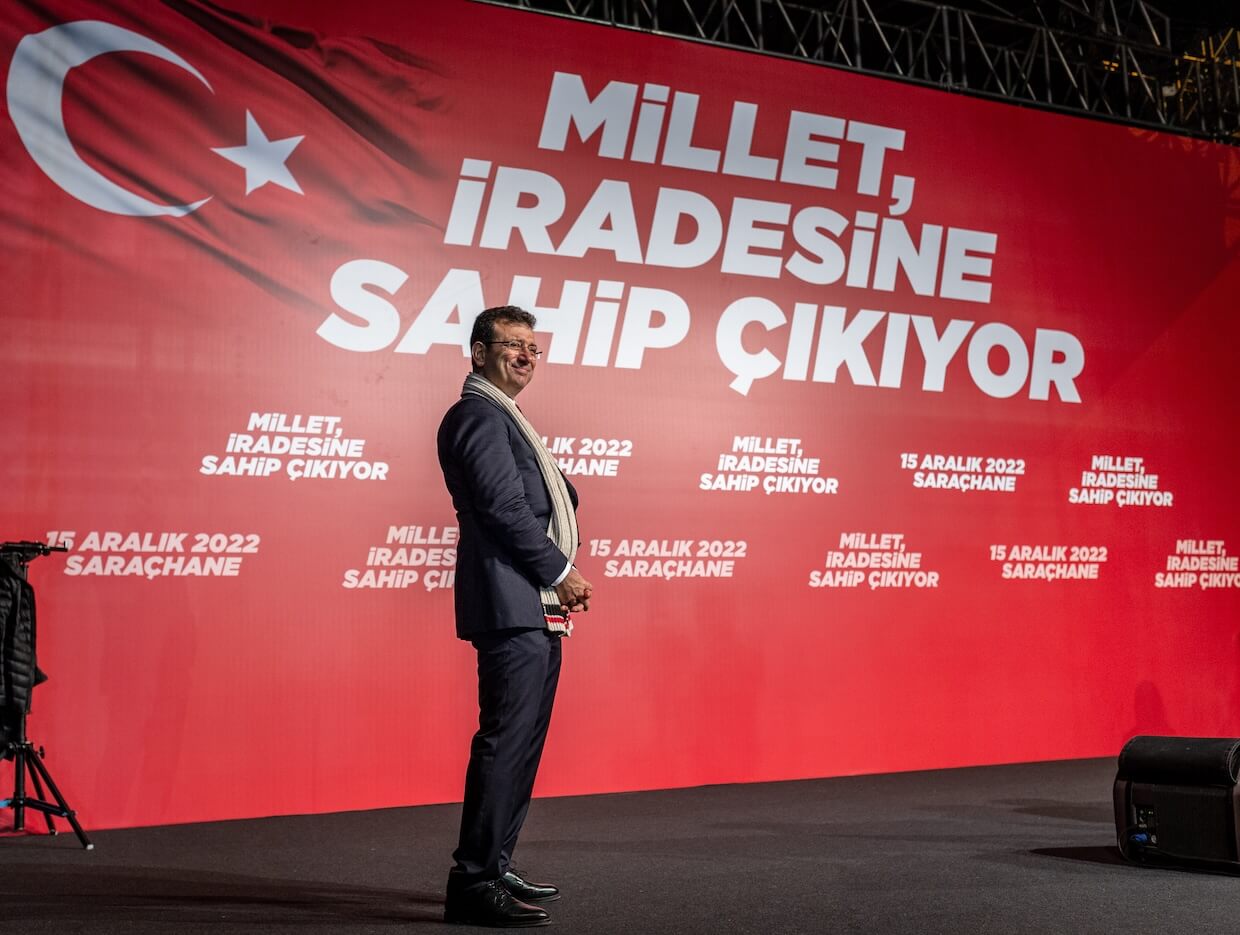
Is the recent political crackdown a sign of regime insecurity ahead of elections, or a calculated strategy to establish post-electoral authoritarian permanence?
Dr. Salim Cevik: I think it’s both a symptom of weakness and of strength at the same time. It’s a symptom of weakness because Erdogan is increasingly lacking popular support.
What made him so indispensable to his allies for so long was his ability to bring the majority of the public with him. He kept winning elections—or, to put it another way, we can certainly criticize the tactics he used to maintain his popularity—but ultimately, he succeeded in staying popular.
That’s no longer the case. In recent years, those who don’t want to see him as president now form a larger coalition than those who do. This was already true in the previous election two years ago, but he managed to survive using various tactics: he divided the opposition, ensured they backed a candidate who couldn’t unify them, and relied on judicial tools—there was already a court case against Imamoglu at the time. He used other instruments too. The key was preventing the opposition from uniting behind a single figure.
But that’s no longer working. The local elections showed that the CHP is now the central actor in the opposition and capable of building a majority larger than Erdogan’s. So in that sense, he’s very weak in terms of popular legitimacy—and that’s what’s pushing him to take these extraordinary measures.
At the same time, he remains very powerful. He controls the state apparatus, the judiciary, the media, and the security forces. And the international context—perhaps you’ll ask about this later, but I’ll mention it briefly—has emboldened him even further. He knows the US is on his side, and he knows that, for a variety of reasons, Europe will stay silent. In that sense, he’s very powerful.
So it’s a paradox: he’s powerful because he can take these steps, but weak because he has to. He can’t afford to leave the competitive authoritarian game as it is and risk an election—even a highly unfair one—that he might lose. So, he takes measures to avoid that risk. In short, he’s strong in terms of state control, but weak in terms of popular legitimacy—and that combination is exactly what’s driving these moves.
Erdogan Exploits Islam as Rhetoric, Not as Rule
Has political Islamism in Turkey under the AKP shifted from a reformist ethos to a mechanism of ideological legitimation for autocracy? Do you see the regime’s increasing reliance on religious-nationalist rhetoric as signaling a radicalization, or merely instrumental populist recalibration?
Dr. Salim Cevik: Well, as I mentioned in the previous question, political Islam in the early 2000s had adopted a reformist character. At the time, they denied being Islamists. The famous claim was that they had "changed shirts," and instead labeled themselves as Conservative Democrats. But that was merely a rebranding—because in order to navigate Turkey’s stringent secularist laws, it was not possible to openly identify as a Muslim democratic party. Unlike in Europe, in Turkey you have to use the label "conservative," even though the public understands that "conservative" essentially refers to Islam and religion.
So, as a Conservative Democratic party, the AKP was indeed a reformist movement in its early years. I have to say that during that period, religious discourse in society also became more pluralistic and democratic—this was part of the cultural conflict in Turkey between authoritarian secularists and the conservative majority. To defeat—or rather, to undermine—the authoritarian secularist powers, who were a minority, Islamist actors adopted the language of democratization and pushed for reform within the system.
But around 2010 to 2012–13—it’s hard to pinpoint an exact moment—once it became clear that Erdogan was no longer under threat, he no longer needed the reformist agenda. At that point, the logic shifted entirely, and Islam became an instrument of authoritarianism, used to justify his populist, majoritarian, and increasingly autocratic actions.
As for the second half of your question, I don’t believe we are witnessing a radicalization. Radicalization would imply a structural transformation of the regime toward a more overtly religious order. If I understand the question correctly, I don’t see that happening—nor has it happened over the past decade. Erdogan has consolidated power, but he has never actually used that power to turn the system into a more theocratic one—he hasn’t changed the legal framework or granted religion greater authority in the functioning of the state.
The only time he explicitly referenced the Quran in policy terms was when he lowered interest rates—an idea that was ill-advised not just from an economic standpoint, but also because it lacked a sound religious basis. Religion prohibits interest altogether—it doesn’t differentiate between high or low rates.
If he had said, “I want to remove interest entirely from Turkey’s financial system because religion requires it,” then we could talk about a genuine turn toward religious rule—where religious texts begin to dictate policy. That would have been a clear move away from secular governance. But instead, he said something else—and I find this very telling. He said, “I’m lowering the interest rates because Islam doesn’t like interest.”
In that moment, it was clear: religion was being instrumentalized to justify a pre-existing policy agenda. He didn’t abolish interest; he didn’t change the institutional rules. He used religion as a rhetorical tool. Religion, in this case, was merely a pawn. And I see no indication that this dynamic will change anytime soon.
Religious Rhetoric Remains, But the Provider Role Is Crumbling

To what degree does the AKP’s Islamic narrative still resonate with its core electorate, particularly in light of economic hardship and rising dissent?
Dr. Salim Cevik: It’s difficult to answer this as a simple yes or no. On the one hand, he clearly still commands a degree of popularity. As I mentioned, he has lost the majority and will probably never recover it, but he continues to enjoy the support of—perhaps—30, 40, or even 45 percent of the electorate. I can’t cite precise numbers, but some of that support undoubtedly stems from religious sentiment. Certain segments of society view him as a devout figure. More importantly, they harbor such deep resentment toward secularists that they rally around Erdogan, whom they see as a protective barrier between themselves and the secular elite. So, part of his enduring popularity is still grounded in religion.
On the other hand, that popularity is clearly in decline, and the driving factor is economic hardship. The economy alone may not be sufficient to build a majority coalition, but it is powerful enough to dismantle one. Or let me put it this way: up to now, Erdogan has played a dual role—both as an economic provider and a religious protector. He positioned himself as the guardian of religious values while delivering material prosperity. That balance was key to sustaining his electoral majority. But if he falters on either front, that majority begins to unravel. He continues to lean on the religious narrative, but he’s steadily losing the economic argument—the “provider” role.
So, yes, his base is eroding. But as I said, it’s a gray area. Religion remains a powerful political tool for him. Yet in times of economic hardship, it alone won’t be enough.
Unlike Gezi, This Time the Protest Began with Repression, Not Resistance
How do the current mass protests compare to the 2013 Gezi Park movement in terms of mobilization dynamics, ideological coherence, and regime response? Could the protests catalyze a broader democratic awakening, or will they be contained through increased repression and securitization?
Dr. Salim Cevik: Let me start with the second half of your question. If the mobilization continues and manages to force Erdogan to back down, it could mark the beginning of a new era of democratization in Turkey. That’s possible, but unlikely. The more probable scenario is that Erdogan will suppress the current mobilization and push the system toward an even more authoritarian model. Still, it’s a process in motion—we simply can’t know for sure yet.
Now, if we compare this to the Gezi Park protests, one major difference stands out. As we discussed in the previous question regarding the economy—when the Gezi protests erupted, they were largely a middle-class reaction. People were frustrated with Erdogan’s growing personalization of power—his attitude of “I am the ruler of this country, and I don’t care what you think; everything goes the way I say.” It was a kind of delegative democracy, as political scientists would call it. “I was elected, therefore I have all the power, and I don’t need to answer to anyone.”
That attitude contributed to the uprisings. And if those protests hadn’t been met with such severe repression, I don’t think they would’ve escalated the way they did. Gezi began as a peaceful demonstration—completely legitimate—and Erdogan could have simply let it happen. Had he done so, we might not have seen the full-scale protests or the resulting political crisis.
I don’t know whether he planned it all from the start, but at some point, Erdogan seemed to decide that Gezi wasn’t a threat but rather an opportunity—a way to boost his popularity. He could frame the protesters as urban, middle-class, secular elites. And that’s classic populist strategy: pitting “the elite” against “the people.” He painted Gezi protesters as privileged, urbanites who were safe and comfortable, yet complaining about trivial matters. That framing resonated with his base.
This current wave of protests, however, is different because it started with repression. It didn’t begin as a small demonstration that spiraled into something larger due to state violence—it began with the arrest of Imamoglu. It was repression from the outset. It was an intentional move to dismantle the competitive element of the regime. So, whereas during Gezi Erdogan’s stance was “I was elected and therefore I rule,” now it’s, “You once elected me, and I’ll make sure you never get the chance to unelect me.” That’s the key difference.
This time, it wasn’t police brutality that brought people to the streets. Rather, people were already in the streets, and Erdogan is trying to stop them with police brutality. It’s a different dynamic.
Also, I don’t think this protest is being led by the middle class. It’s being led by urban youth who feel economically crushed, who don’t see a future for themselves, and who are desperate. That’s why they’re protesting. In that sense, this moment feels more radical than Gezi. Back then, protesters were largely middle-class—they had something to lose. They wanted a more responsive government, but they weren’t acting out of despair.
Today’s youth have little or nothing to lose. That’s why even harsh state repression hasn’t stopped them—at least not yet. I was a young academic during Gezi—I was a university assistant, and by Turkish standards, I had a pretty good life. I honestly don’t think even full professors today enjoy the lifestyle I had back then. The economic decline has been dramatic. And I don’t think today’s university assistants, graduate students, or undergrads see much hope in their futures. That, too, fuels their willingness to take to the streets.
So yes, in that sense, there are some fundamental differences between then and now.
Ballots Aren’t Enough—The Opposition Must Mobilize the Streets
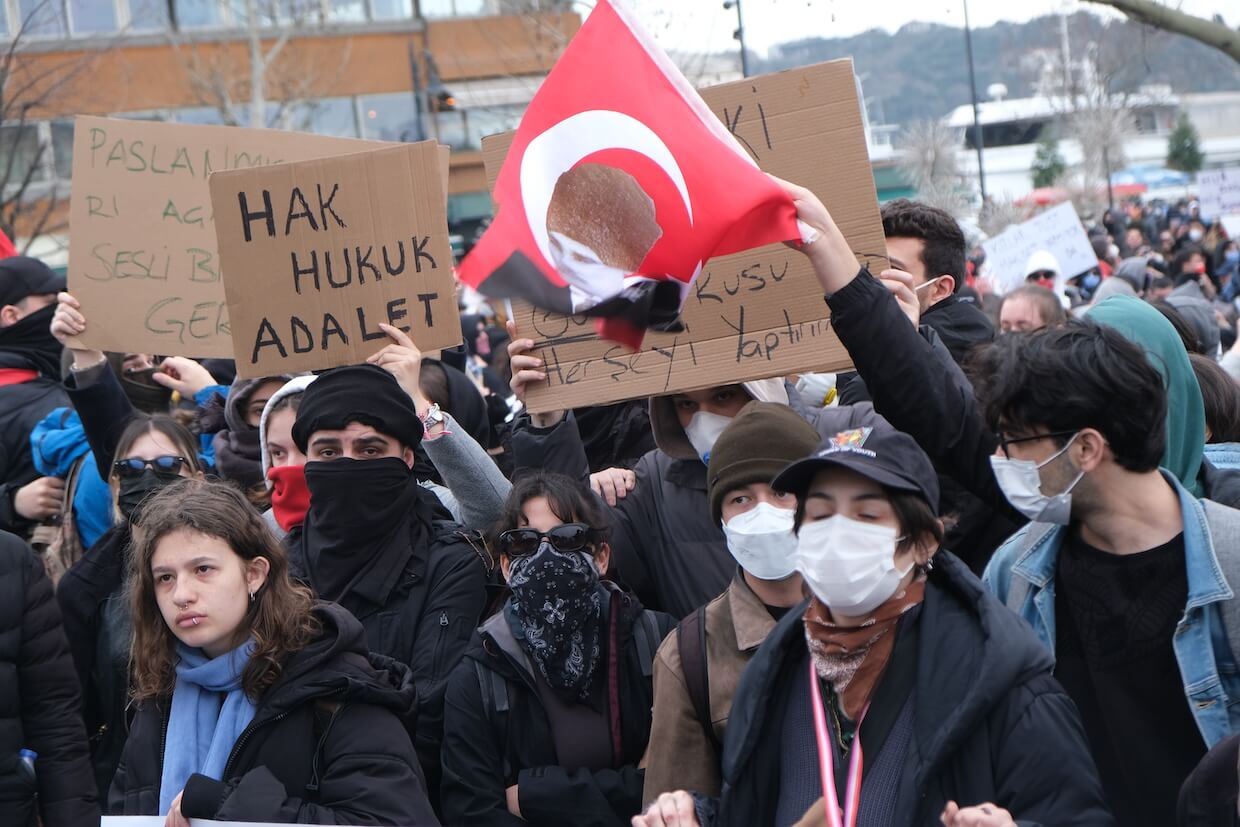
What does the sidelining of Imamoglu suggest about the regime’s tolerance for political pluralism within the current constitutional framework? What risks do opposition parties face in navigating between electoral participation and resistance within an increasingly autocratic system?
Dr. Salim Cevik: Well, the opposition parties are now in a dilemma. I’ve been talking about how the competitive element is disappearing. It’s becoming a fully authoritarian regime, and I’m sure that at some point people will begin to ask: “Is this just theater? Why are we playing our roles in this performative act that only serves to legitimize Erdoğan’s authoritarianism? Why are we even competing in the elections?” I think that would be a trap—the same trap the Venezuelan opposition fell into at one point.
Whatever happens, there will be pressure on the opposition to boycott the elections or withdraw—but I think that would be the wrong path. No matter what, the opposition must go to the ballot box, participate in the elections, and make it clear to the public that they won. I’m not saying the regime can necessarily be unseated through elections—I think we are passing that threshold. I use “passing” intentionally—I’m not saying we’ve already crossed it. It’s a process. But even if we eventually do pass that threshold, and it becomes impossible to remove the regime through elections alone, the opposition must still participate and demonstrate that they hold the popular majority.
At the same time, they have to acknowledge that it probably won’t be enough. You can no longer unseat Erdogan simply through words or ballots. You need to mobilize the streets—through demonstrations and by raising a broad popular demand for change. The opposition must combine both strategies: win at the ballot box and sustain mobilization on the streets.
Europe Made the Same Mistake with Putin—Why Trust Erdogan?

And lastly, Dr. Cevik, how do you interpret the EU’s and US’s muted response to Imamoglu’s arrest? Can this be read as a form of tacit legitimation or geopolitical pragmatism? To what extent does Western inaction amount to a “green light” for Erdogan’s continued autocratization?
Dr. Salim Cevik: I think this is a very important question, and thank you for asking this. And, as I said in one of the previous questions, Erdogan feels both very weak because he’s losing popular legitimacy, but he’s also feeling very strong because he has control of the coercive apparatus of the state, and he also has international backing. And when we say international backing, he has the backing of both Americans and Europeans.
We have to talk about this very briefly, so let me say a few words about both. I mean, if Trump talks with Erdogan, he would probably ask for advice on how to repeat what Erdogan is doing in Turkey in the United States. So obviously there would be no backlash coming from the American side, and all democracy movements in the world have to adapt to the fact that America is no longer ruled by a democrat. I mean, America’s own record for supporting democracies has always been a critical one. It has sold out democrats when it suited its strategic interests—that’s for sure. But it has now come to a point where America is ruled by a president who actually admires autocrats more than democrats. So we’ve left that era behind.
And for the Europeans, I think it’s clear—they will criticize it, and they do criticize it with weak words and sentences, expressions of concern. But nothing will come out of it, and everybody knows that they don’t mean it, because they actually feel that they need Turkey more than ever. Once Trump made it clear that American security guarantees are no longer reliable, Europe began discussing creating its own strategic autonomy, its own defense capabilities—and Turkey emerged as a very crucial actor here, with its strong military, large population, and growing defense industry, as well as its strategic location. So Turkey is a very important partner, potentially, for European security. And Erdogan knows this and hopes that Europe will ignore his authoritarian moves because they need him—and so far, he has been proven right.
But let me finish by saying that it is not only a normative mistake for Europe to allow Erdogan to make this move—hoping that Turkey is strategically important—but it’s also strategically blind thinking. Because once Erdogan removes all the thresholds between himself and full authoritarianism—once Turkey becomes a Putin-like regime—the question for Europeans should be: can a regime like that be trusted for security cooperation? Can it really be a security partner?
Turkish–European relations have been transactional for the last decade, and an authoritarian figure like Erdogan was quite fine for that. Transactionalism allowed for bargaining, and you could prefer to deal with a single individual rather than a state—and that was fine. But once you move beyond that—if you want to create a strategic partnership between Europe and Turkey, if Turkey is to become an important part of European security—then you can’t really trust a personal autocracy.
Europe made the same mistake with Putin. They hoped that by creating economic interdependencies, Russia would never be a threat to European security—and they were proven wrong. I see no reason why Erdogan should be trusted more than Putin in that sense, and why European security should be entrusted to a political system that is ruled by the whims of a single individual.
As I said, it’s not only normatively and morally wrong—it’s also strategically blind thinking on Europe’s part.


